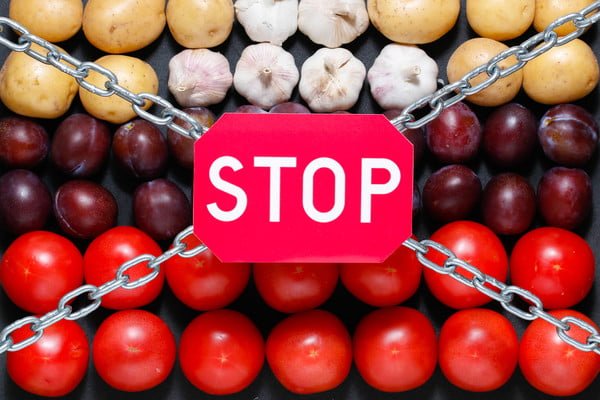Due to the increasing number of produce trade restrictions in the region, mostly completely unfounded, EastFruit decided to prepare a rating of the worst trading partners in the region, using only facts for the assessment.
How can farmers or investors use this information? If a farmer grows or if an investor plans to start growing fruits or vegetables, significant part of which is exported to a country which is ranked high in this ranking, it may be worth considering diversifying production or investments. Moreover, the higher the country is in the ranking of the unreliable is the partner and the higher the risks for investor’s business.
The following criteria were used to compile the rating:
A. Bans on the import of vegetables and fruits from other countries
B. Level of import duties
C. Number of non-tariff restrictions
D. Level of corruption at customs and average time for goods to cross the border
E. Export Bans
F. Other problems such as blocking of goods entry points
The ranking does not include all countries in the region, but only those for which EastFruit has a sufficient amount of information, namely: Uzbekistan, Tajikistan, Georgia, Moldova, Russia, Belarus, Turkey, Poland, Hungary, Slovakia and Romania.
To assess these indicators, statistical data was used, and in case of their absence, expert assessments based on surveys of fruit and vegetable market participants.
As a result, by a huge margin from others, Russia was recognized as the region’s worst trading partner for fruit and vegetable trade. This is not at all surprising, because there are almost no countries left in the region against which Russia country has not imposed an embargo on vegetable and fruit imports at least once and most of these were the politically motivated bans. In the last week alone, two countries in the region have faced bans on supplies to Russia: Armenia and Moldova.
The Russian Federation also has a relatively high level of customs duties, a traditionally high level of corruption at customs and a large number of non-tariff restrictions for fruits and vegetables.
Four countries competed for second place in the ranking of worst trading partners: Poland, Tajikistan, Turkey, and Belarus, but Poland won by a narrow margin. In addition to the traditional problems for the EU in the form of a large number of non-tariff restrictions and a high level of tariff market protection, Poland differs unfavorably from others by the high level of corruption at customs and frequent violations of EU laws. In particular, Poland has repeatedly introduced bans on imports of agricultural products from Ukraine without explaining the reasons, although it does not have legals rights to do so, because the European Union has a common trade policy for all countries. In addition, Poland is currently actively helping Russia in the fight against Ukraine by illegally blocking checkpoints on the border with Ukraine, which has already led to huge economic problems for Ukraine.
Turkey is negatively characterized by a high level of protection of its own market and manual regulation of trade, which impedes the establishment of long-term trade relations. In addition, Turkey is introducing bans on the export of products, which is a big negative factor for the trade.
As for Tajikistan, the main problem here is corruption at customs, non-tariff manual regulation of exports and imports, export bans and other factors. The situation in Belarus is a little better, but in general the problems are the same – this partner for fruit and vegetable trade cannot be considered reliable.
Uzbekistan took sixth place in this ranking. Here it is necessary to note the constant improvement of the situation over the past five years, which allows the country to constantly open new markets, as well as obtain new suppliers. The overall picture is somewhat spoiled by periodic export bans, as well as only temporary zeroing of duties on a number of goods, which impedes long-term relations.
Two more EU countries were included in this “anti-rating” – Hungary and Slovakia. Both have tarnished their reputations with illegal bans on imports of agricultural products from Ukraine, and Slovakia has added to this the blocking of border checkpoints.
Ninth place goes to Romania. This country has only the same problems as all EU countries – a high level of tariff and non-tariff protection of its market.
Ukraine took tenth place in this ranking. Ukraine’s main problems are corruption at customs and slow procedures, but in other respects the country performs better than many of its EU neighbors. Despite illegal trade restrictions by Poland, Slovakia and Hungary, Ukraine did not introduce reciprocal measures, strictly following the international agreements. Also, Ukraine did not introduce non-tariff restrictions on products from these countries, and the level of import duties here is one of the lowest in the world.
Moldova and took penultimate place – the situation in this country is improving, the number of various artificial restrictions is decreasing. However, the country has the same problem as all post-Soviet countries, although on a different scale – these are elements of corruption at customs. Moldova can somewhat improve the situation with corruption and various non-tariff regulations and bans, which have recently begun to happen much less frequently.
Georgia can be considered the best partner of the region. Almost complete trade liberalization, low duties, the absence of non-tariff barriers and bans on imports and exports and a low level of corruption make this country a good trading partner, even despite the small size of the domestic market.
The use of the site materials is free if there is a direct and open for search engines hyperlink to a specific publication of the East-Fruit.com website.




